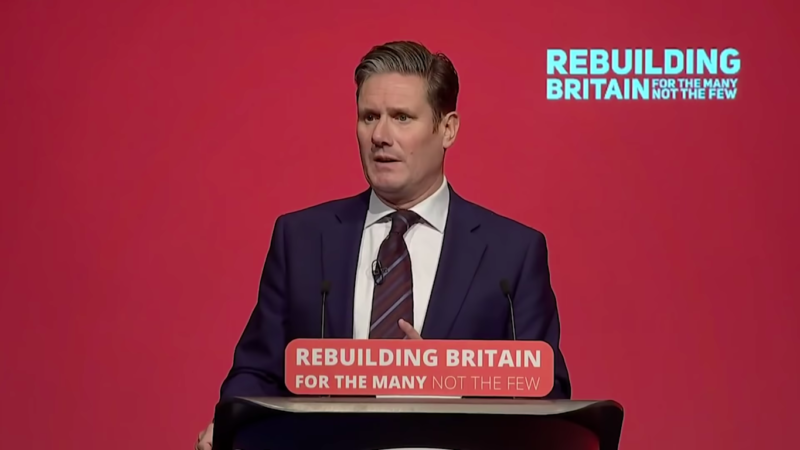
The election of a Tory government is a profound challenge for the labour movement. It is necessary for any candidate for the leadership of our party to set a clear path about how they intend to work with the trade unions.
Already we have seen Boris Johnson further watering down weak commitments on workers’ rights in his Brexit legislation and threatening the right to strike. I have no doubt that trade union rights – already among some of the weakest in Europe – as well as public sector pensions and environmental protections will be next in his sights. The Tories also made promises on funding for our schools, hospitals and infrastructure for which they must be held to account.
These are going to be difficult and important years for the trade union movement and it is my commitment that if elected as Labour’s leader the party will stand side-by-side with trade unionists. The Labour Party was born out of the trade union movement. Together we have achieved so much: from the minimum wage to the basis of the welfare state we all rely on – decent pensions, the Equal Pay Act, strong public services, and fundamental rights and protections at work.
That is why I agree with the revival of the tradition that the leader of the Labour Party attends and supports the Durham Miners’ Gala. A manifesto for 2024, for a government that will take us to the 2030s, must put the needs of working people and their families at the centre of delivering a green industrial revolution and greening our industries, confronting the onset of AI, the growth of insecure work and the gig economy, and restoring dignity for all in the workplace.
The general election means we are leaving the EU. The Leave-Remain divide is for the past. We must now settle the kind of future relationship we want with Europe, and fight to prevent the UK being dragged into bad deals with Donald Trump that threaten our public services and our protections at work. This is an agenda the labour movement must unite around, whichever side people took over Leave and Remain.
As we rebuild from the election defeat and face these and other challenges, we need to be absolutely clear that the bond between the unions and Labour cannot be weakened. We did not lose the election because we promised to boost public sector pay, restore collective bargaining, give workers a real say in their workplaces, invest in our public services or end outsourcing to the private sector.
We did not lose because we believe public services like the railways should be in public hands rather delivering profits for shareholders. Nor did we lose because we promised to repeal the malicious 2016 Trade Union Act and its unfair thresholds on ballots for industrial action – and we must continue to oppose that during this parliament.
There can be no going back from that agenda. No sacrificing our core principles. No over-steering or accepting the Tory narrative. We are a party and a movement that opposes austerity, supports common ownership and believe in public services.
I want us to unite around that agenda. During the general election, some of our strongest and most dynamic campaigns and policies came from our trade unions. The days of unions being seen as cash-cows during elections but otherwise peripheral are over and must never come back. Labour needs to do far more to harness the unions’ campaigning skills, and to make sure that trade union members are a core part of our campaigning and policy development all year round.
UNISON has helped make the NHS and issues facing care workers and their families one of the biggest political questions facing our country. Unite the Union’s ongoing campaign on universal credit and its pressure over fair tips for waiting staff both put justice and fairness in the spotlight. Its campaigns, such as over blacklisting, have built wide support.
GMB’s campaign to support Amazon workers places the labour movement at the heart of a national debate about the nature of work in modern Britain. CWU’s work to press for accessible, affordable broadband shows how the labour movement can be at the centre of transforming our economy. USDAW’s defence of the dignity and safety of shop-workers is essential in the modern retail economy. All of these and the work of the wider trade union movement points to the future.
If we are to rebuild trust with working people, we need to ensure that a commitment to defending workplace rights and public services is central to everything we do. To do this, we need to end the division that has too often held us back. I want to see a more united party because working-class communities depend on us to win power.
One of the big tests of the next five years will be whether we can grow and unite the labour movement in the face of the common threat Johnson poses to our rights and public services. If we can, I believe another future is possible: one where we do not accept that austerity, privatisation and outsourcing are inevitable. Or that working people have to accept another decade of Tory rule.
“Unity is strength” is one of the great truths of our movement. We need unity to rebuild our strength now more than ever.




More from LabourList
Government announce SEND reform in schools white paper
SPONSORED: ‘Industrial hemp and the challenge of turning Labour’s priorities into practice’
‘A day is a long time in politics, so we need ‘action this day’’